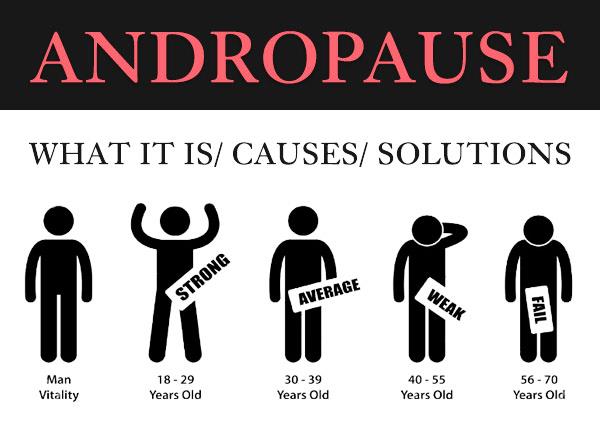The term ‘menopause’ is a common medical word associated with women whereby they stop seeing their menstrual cycle as they begin to age This occurs often from age 45 and above, although younger women have reported cases of menopause. During this period, a woman no longer produces eggs, therefore cannot become pregnant naturally.
For women, this stage is associated with certain body changes such as mood swings. Do men go through similar hormonal changes? Yes; men also experience these changes. Doctors are noticing that men are reporting some of the same symptoms that women experience in menopause.
Have you been losing interest in sex and feeling rather weak, tired and moody lately? If you are a male past middle age, you may be experiencing symptoms of hormonal changes called ‘andropause’, commonly called “male menopause”.
What Is Andropause – Male Menopause?
Andropause is a medical condition in men usually triggered by low testosterone as they age,
As you age, your testosterone levels will typically begin to drop. According to medical reports, testosterone levels tend to decline an average of 1% per year after a man turns 30 years of age (as shown in the picture above) Some health conditions can cause earlier or more drastic declines in your testosterone levels.
It is important to note that andropause is not the male equivalent to female menopause. Not only do men not lose the ability to reproduce completely, not all men experience it.
Unlike the female menopause when hormone production stops completely such that the woman would be unable to give birth, the man can still to get a woman pregnant; healthy men may be able to make sperm well into their 80s or later. More so, there hasn’t been any concrete research that shows that men can naturally experience this at a very young age.

However, certain medical conditions can trigger early andropause, such as testicular cancer and the surgical removal of the testes. Prostate cancer patients who receive anti-testosterone therapy to maintain very low testosterone levels can also experience andropause.
What is Testosterone?
Testosterone is the hormone that fuels typical changes involved in male puberty, such as: growths of your muscle mass, growth of your body hair, lowering of your voice, increase in libido (sex drive), and for stimulating sperm production. Your testosterone levels also factor into your sex drive. Testosterone is produced in your testicles. When your testosterone levels decrease, your desire for sex also decreases.
Signs and Symptoms
As you continue to age, it is normal for men to experience physical, sexual, and emotional changes as a result of a decline in testosterone production. Testosterone levels can be checked by a blood test, but tests aren’t usually done. Many men who have low testosterone levels experience no symptoms. In addition, the signs and symptoms associated with low testosterone aren’t specific to low testosterone. They can also be caused by a person’s age, medication use or other conditions, such as having a body mass index of 30 or higher.
Some symptoms associated with low testosterone levels include:
– Low sex drive.
– Fatigue.
– Infertility.
– Reduced muscle mass.
– Irritability and mood swings.
– Erectile dysfunction.
– Depression.
– Breast discomfort or swelling.
– Decreased testicle size.
– Loss of body hair, etc.
Low levels of testosterone associated with male menopause have also been linked to osteoporosis. This is a condition where your bones become weak and brittle; however, this is a rare symptom which typically affects men at the same age as women entering menopause.
Treating Andropause
While the symptoms associated with andropause can seem overwhelming, you can manage your symptoms and their severity. Your doctor may also recommend certain lifestyle or other changes to help with some symptoms of male menopause. These include:
- Eat a balanced diet, rich in essential vitamins and nutrients
- Get regular Exercise program and physical activity
- Get the recommended 7-9 hours of sleep
- Manage your stress levels.
Most importantly, if you’re experiencing depression, take medications, such as an antidepressant, supplements, etc., as prescribed by your doctor
Hormone replacement therapy is another treatment option. However, it’s very controversial. Like performance-enhancing steroids, synthetic testosterone can have damaging side effects. For example, if you have prostate cancer, it may cause your cancer cells to grow. If your doctor suggests hormone replacement therapy, weigh all of the positives and negatives before making your decision.
After adopting these habits, men who are experiencing symptoms of male menopause may see a dramatic change in their overall health.
